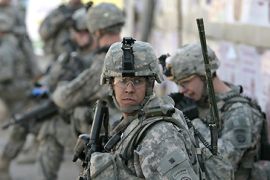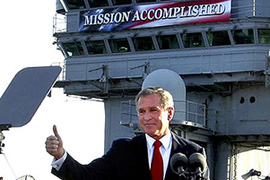Making the Iraq war disappear
Analyst says US media seems no longer interested in assessing impact of US invasion.

 |
| Anti-Iraq War protests have steadily dwindled since the US-led invasion seven years ago [EPA] |
The American media loves anniversaries of major events because these provide the ideal news pegs to do follow-up stories.
You would think that they would have pulled out the stops for the seventh anniversary of the US war on Iraq, a conflict that was described by the Pentagon in its first days as a “cake walk” and designed as a quick intervention modelled after the in-and-out combat of Operation Desert Storm ending Baghdad’s 1990 invasion of Kuwait.
| special report |
 |
However, not only did US plans not work out that way, but the news commitment faded and, in the process – as one would expect – so did public attention.
The networks went from ‘all the war, all the time,’ to withdrawing troops long before the military did.
As a result, the situation was uniformly described as “quiet” with no real assessment offered on the costs, casualties and consequences of what just about everyone considers a botched and failed mission.
This has been a war which Washington still seems unable to end despite the campaign promises of a new president.
Focusing on elections
In Iraq, the focus is on election results. It seems as if the votes are really being counted and, so far, the results have been surprising.
What we are seeing there is a see-saw Florida-like drama in which a prime minister who heads a religious party is being challenged by a former leader who is fighting for a sectarian future.
In short, the elections will be proclaimed as a ‘victory for democracy’, despite the conflict continuing in Iraq. Meanwhile, the pro-war crowd in the US will remain largely silent, fearing a complete US withdrawal from the war-ravaged country and its eventual disintegration.
Washington may have divided the Iraqis while at the same time uniting them – against the US occupation.
Unreported is what the US seems to have learnt from the Serb war on Bosnia (even as it nominally opposed the ethnic cleansers in Belgrade.)
The Iraq war quickly turned into an ethnic war aimed at fracturing the unity of a multi-ethnic Iraq, however brutally maintained by Saddam Hussein, who was once Washington’s darling.
Our media seems to have forgotten it was the US strategy to divide the Sunnis and the Shia, building walls and fostering divisions between neighbours even when we joined in the celebration of the fall of the Berlin Wall.
We played the old game of divide and rule; such is the logic of occupation.
Failure to assess
 |
| Some US media have portrayed the Iraqi elections as a “mission accomplished” [AP] |
The Boston Globe quoted an educator exposing this but then he was prominently identified by his tribe: “Failure is the word that should be linked with the US war,” said Mohammed Thabit, a retired teacher from Saddam Hussein’s hometown of Tikrit,” the Globe wrote.
Identifying him from Tikrit is essentially labelling him a Sunni.
“The Americans brought people to power, but those people are specialised in reprisals, blackmail, inflaming sectarianism, and robbing.”
How true is his claim? None of the journalists I read bothered to assess or investigate.
The anniversary has also been a low-key affair in the US where attention is focused on the healthcare issue and where a new domestic war has broken out between a resurgent right and the Democratic centre.
In some quarters, Barack Obama, the US president, is being demonised as a Hitler in much the same way that Saddam Hussein was referred to as a brutal dictator.
Reforming healthcare may be our issue du jour but what is really at stake is an attempt by Republicans to roll back the 2008 election.
“This is about November [2008], not a vote this week, ” says Jesse Jackson, the civil rights leader. “The Republicans have a ‘pre-existing condition’, a determination to revenge the election they lost.”
He calls the fever-pitch polarisation in our politics “a new civil war”.
Only this time it is sections of the media that are inflaming the issue and not reporting it as they should.
Fraud, fraud, more fraud
The one story that has been getting attention in the US revolves around fraud in Iraq on a gargantuan scale; some $50bn have been reported missing recently in various war contracting scams. The focus on these financial frauds, however, avoids the fraudulent nature of the US invasion itself.
At the same time, fraudulent schemes that helped bring down Wall Street are barely covered even as many experts say the costs of the wars in Iraq and Afghanistan must be factored into any assessment of why the US economy is still in collapse mode. These trillions are usually not factored in.
The failure to “connect the dots” in the US is not, unfortunately, an anomaly.
There are still protests underway; there were vigils in Boston, and a protest largely against the fighting in Afghanistan is planned for Washington next week – but the mass anti-war movement which mobilised millions before the war erupted seems to have run out of gas.
The media barely covers what protest remains – much of it largely fired up by former soldiers confessing to crimes they say they committed. When “our troops” were dying, they were honoured; now that many have turned on the war, they are ignored.
Alternative media
And as for journalism, it is the alternative media and “citizen journalists” who still shine light on what seems like a war without end, along with international broadcasters especially Al Jazeera.
Here’s a comment from “Tony B” on the site Gather.com:
“There’s a temptation as we begin to end our combat presence in Iraq to search for the happy ending. Newsweek, for example, recently ran a cover photo of President Bush with the infamous “Mission Accomplished” banner in the background, declaring that now; finally, we have ‘Victory At Last’.
“But that’s an awful revision of history. We have an obligation to insist on uncompromising truth rather than the versions that make us feel better about ourselves. Tens of thousands of dead people demand it. No “mission” was accomplished in Iraq because we went to war on false pretences. We failed the moment we invaded.”
One website, Truthout.com adds that some Americans continue to be shocked, have never been awed, and have not yet adjusted to the senseless loss of national blood and treasure. The editors there are angered by the damage to American honour and our reputation.
They write: “Operation Enduring Freedom and Operation Iraqi Freedom – the latter unleashed seven years ago today – have morphed into a single Operation Enduring Occupation, set to bankrupt this country financially as well as morally, to destroy our own security as it has that of the over 31 million people who populate Iraq.”
What more is there to say? Unfortunately, most mainstream US media outlets have moved on, preferring to forget and downplay what happened in Iraq and their role in the war and occupation.
News Dissector Danny Schechter edits Mediachannel.org. His new film, Plunder treats the financial crisis as a crime story (Plunderthecrimeofourtime.com).
Al Jazeera is not responsible for the content of external sites.
The views expressed in this article are the author’s own and do not necessarily reflect Al Jazeera’s editorial policy.